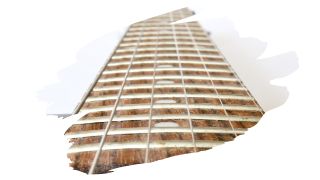Fretboard conditioning oils are a fantastic way to keep your fretboard from drying out. They’ll keep your wooden fretboard from cracking (which can cause frets to shift and come loose).
But, why bother pay for a premium fretboard conditioning oil, if you can just buy lemon oil instead?
Well, in this post, you will discover whether you even need a fretboard conditioner in the first place. You will also learn the key difference between pure lemon oil and fretboard ‘lemon‘ oils.
And we reveal the best (and more affordable) alternative to using high-priced fretboard conditioners (hint: you can buy it from your local pharmacy right now).

This post may contain affiliate links to products that we receive a commission for (at no additional cost to you). Learn more here.
What Exactly Do Fretboard Conditioners Do?
Well, wood can become very dry, if it isn’t cared for. This usually comes about as a result of moisture-damage (due to big shifts in humidity).
You see, wood can easily absorb humid water vapour. And, as that vapour evaporates, it dries out the lumber. Additionally, very hot dry climates can do a number on wood, leeching it of all moisture content. And this is why wooden fretboards are susceptible to cracking over time.
However, if you use fretboard conditioner, this oil-based product will soak down into the wood grain of unfinished fretboards. And it can stop wood from cracking by nipping the problem in the bud.
This is because conditioning oil will coat fretboard wood fibers, blocking moisture from ever being absorbed in the first place.
What About Lemon Oil? Does Lemon Oil Dry Out A Fretboard?
Pure lemon oil, (that’s been squeezed from the lemon rind), is an incredibly acidic liquid. It is so harsh that it can even begin to break down the very glue used to keep frets in place.
In short, you must never use pure Lemon oil on a fretboard.
Related Post: Deciding Between Lemon Oil Vs Tung Oil For Your Fretboard
So Why Is Lemon Oil Marketed As a Fretboard Oil Conditioner?
When we talk about fretboard lemon oils, we are describing something very different from pure culinary Lemon oil.
You see, fretboard lemon oil conditioners are actually made from a petroleum-sourced substance called Mineral Oil.
Mineral oil is made from highly refined petroleum (also known as petroleum distillate). And this oil is so filtered that it’s even safe for human consumption.
You can buy 100% pure food grade mineral oil from most local pharmacies. And it is this food-safe product (not lemon oil) that’s the key ingredient in a lot of fretboard conditioners.
The ‘lemon’ ingredient in fretboard lemon oil is just a few droplets of lemon oil added for the scent. But, it’s the mineral oil doing all of the heavy lifting, when it comes to conditioning your fretboard.
Why Mineral Oil? Is It Honestly Safe To Use On A Fretboard?
Well, the reason why mineral oil is a popular wood finish, is because it’s a non-drying non-toxic oil that doesn’t go rancid. This makes it perfect for protecting food prep surfaces (such as cutting boards and chopping blocks).
You see, mineral oil acts in a similar manner to drying oil finishes, (such as Linseed oil and Tung oil). This oil will sink down into fretboard wood and coat those wood fibers. This, in turn, will stop your fretboard from absorbing moisture in a highly humid environment.
However, unlike drying oil finishes, mineral oil leaves next to no build up on the surface. And it does not dry and harden into a durable resin either.
This makes mineral oil perfect for coating unfinished fretboards. Why? Because you can get the advantage of moisture-resistant protection, without any of the hard resin build up.
While, if you used a regular drying oil (i.e. Linseed oil or Tung oil) to regularly condition your fretboard, that drying oil would build up and harden around the frets. And, this would make your fretboard increasingly difficult to play.
Should You Use A Fretboard Conditioner?
It depends on if your fretboard is finished or unfinished.
You see, the wood of a finished fretboard has been ‘sealed’. This means that it has been coated with a water-repellent durable substance (such as Tung oil or Polyurethane). This sealing finish will have filled out the wood pores of the fretboard, and sealed over the grain.
Basically, finished fretboards already have a sealing coat that protects them from drying out.
So, there is no need to apply a fretboard conditioner to a finished fretboard. And, besides, a conditioning oil wouldn’t be able to get past the sealing finish (to the wood beneath) anyway.
What About Unfinished Fretboards? Do They Need A Conditioner?
An unfinished fretboard has no protective sealing coat. And, as they have not been sealed, there is nothing safeguarding them from humidity, moisture, and extreme temperature changes.
This leaves unfinished fretboards very vulnerable to cracking. Which is why guitar makers tend to only leave fretboards unfinished if they happen to be made from very durable hardwood.
Durable hardwoods such as Rosewood, Ebony, and Roasted Maple, can handle moisture much better than most other types of timber. However, even they will need a conditioning oil treatment every 12 months or so.
At the very least, anytime you start to see fine cracks appear on these fretboards, it’s time to condition them.
Do You Have To Use Fretboard Conditioner? What Can You Use Instead?
You don’t need to use a specialized fretboard conditioner product. Instead, get your hands on some pure 100% food grade mineral oil from your store, and it will work just as well.
Alternatively, you can use a highly refined version of coconut oil called Fractionated Coconut Oil.
This particular product is nothing like culinary coconut oil. Instead, fractionated coconut oil has been filtered of all of its natural fatty acids. Those fatty acids are the reason why coconut oil goes rancid in the first place.
So, fractionated coconut oil won’t go off. Plus, it’s a non-drying oil too (just like mineral oil).
You can learn more about Fractionated Coconut Oil (and whether it is suitable for your guitars fretboard) by checking out our post here: What Can You Use As A Fretboard Oil Substitute?
Can You End Up Over Oiling a Fretboard?
You can certainly over oil a fretboard. That’s because it’s easy to forget that conditioning oils are simply a preventative measure. The goal of conditioners is to keep a fretboard a little bit moisturised.
You’re not trying to saturate your guitar with this stuff. Besides, a very greasy fretboard would be a nightmare to play.
So, simply stick to putting a tiny droplet of oil between each guitar fret, and no more. And then rub that oil right down into the timber, leaving no grease behind on the surface.
To Wrap Up, Here Are The 3 Key Takeaways From This Post…
- 1). Pure lemon oil should not be used on your fretboard. However, some fretboard conditioners may contain a few droplets of lemon oil (for the scent).
- 2). Fretboard conditioners prevent wooden fretboards from cracking. But, these oils need only be applied onto unfinished fretboards.
- 3). The main ingredient in fretboard conditioners is not lemon oil, it is in fact 100% pure food-grade mineral oil.



